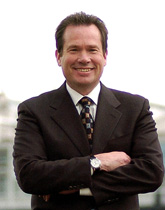The small, plastic bird bobbed aimlessly as the clock sputtered, then choked out one final, "cuuuuckoooo" before stopping entirely. "Uh oh," the 11-year-old thinks, "now I'm really going to be in trouble!" He had dissected the bird to find out how it talked. Now it was dead. His mind raced back to when he took the gas air conditioner apart. This was almost as bad as that! He just wanted to know how heat could cool, but when he cut some tubing inside, ammonia spewed throughout the garage. He remembers that his mom hadn't understood then, and he had a sneaking suspicion she wouldn't understand now. To her, the air conditioner was an expensive science experiment on a sparse family budget. And now the family's cuckoo clock was another victim in his attempt to understand "why." Fortunately, his mother was more understanding than he recalls.

When Bruce McWilliams reached high school, he remained curious, especially in physics. As a senior, he wrote a paper on solving a differential equation. His brother, Thomas (E'75), who was at Carnegie Mellon studying computer science and electrical engineering, passed along Bruce's paper to one of his professors, who was impressed with the high school student's level of thinking. A full scholarship, room, and board followed. "My father died when I was very young, and we didn't have a lot of financial resources," says McWilliams. He enrolled.
Four years later, in 1978, he had already earned his undergraduate and graduate degrees in physics. A PhD would follow three years later. He planned to pursue a career in academia, but as he was finishing his PhD, he re-evaluated his future. "I remember thinking how slow research progressed and not having a lot of patience," says McWilliams.
Without responsibilities, he made a startling decision. He would forgo years in academia for the business world. As he was figuring out his next move, he bumped into one of his former Mellon Institute professors at a pizza shop. The chance meeting led to a Mellon Institute senior fellowship doing research for Pittsburgh-based companies.
California-based Lawrence Livermore National Laboratory took notice of the physicist-turned-executive and wanted to hire him. "Finally, when I had enough of the snow and ice, I said, 'Yes!'" he says. Six years later, it was the president of Fairchild Industries who took notice of McWilliams. He asked him to start a company that would build electronic products like those he developed at the lab. McWilliams welcomed the challenge. "I had an immense amount of self-confidence because I had not yet failed."
Would his success streak continue? "I realized I knew very little about running a business," he says. "How do you organize a business? Can I make payroll next month? I was good at leading scientists, but this was a whole new level of issues." McWilliams says he put his Carnegie Mellon education to work because he found that business--much like science--requires problem-solving techniques. The techniques worked as the onetime scientist secured a $5 million capital investment. The company ended up being successful and was acquired by Flextronics, which today does $30 billion annually.
The wooing of McWilliams continued first to another start-up called sVision in 1996, and then in 1999 to Tessera Technologies, which was losing more than $17 million annually. The company expected big things from McWilliams, and once again, he delivered. Less than a decade after he joined the company as chair, president, and CEO, it has grown to a value of more than $1 billion. McWilliams doesn't take all the credit. "For some reason, the right people would come along at just the right time to help realize my dreams," he says.
Although it would be hard to question his decision to choose business over physics, McWilliams says he wondered what life would have been like as a scientist. It was the scientist in him that accepted a Carnegie Mellon invitation to the 2005 Buhl Physics Lecture. After attending, he soon returned to campus again for another alumni event, where he re-connected with professors, toured the university, and was reminded of his days on campus and his love for science.
It was a love he wanted to rekindle and share. He and his wife, Astrid, created the Astrid and Bruce McWilliams Fellowship in the Mellon College of Science, an endowed fund to support graduate students conducting research in emerging fields such as nanotechnology, biophysics, and cosmology. "I really liked the fellowship idea because my education was made possible by a scholarship," he says.
There was more to come. Since 1980, McWilliams had been journaling his thoughts on life and work. These days, his entries are usually written around 5 a.m. before work and lately they have been on general relativity. The entries gave him another idea.
"General relativity is what turned me on to cosmology,, he says. And so from his packed journals, where he still tries to understand "why," came the idea of providing funds for the McWilliams Center for Cosmology. Scientists at the center search for answers to some of the fundamental questions needed to uncover the dark part of the universe.
The McWilliams' $5 million donation helped launch the center this past spring. It also means that McWilliams no longer wonders what life as a scientist would have been like. "The fun thing is that I now get to do both business and physics," he says. "It's like having a bunch of scientists to go work with."
Laurel Bosshart, a former newspaper reporter, is the assistant director of alumni communications. She is a regular contributor to this department.



